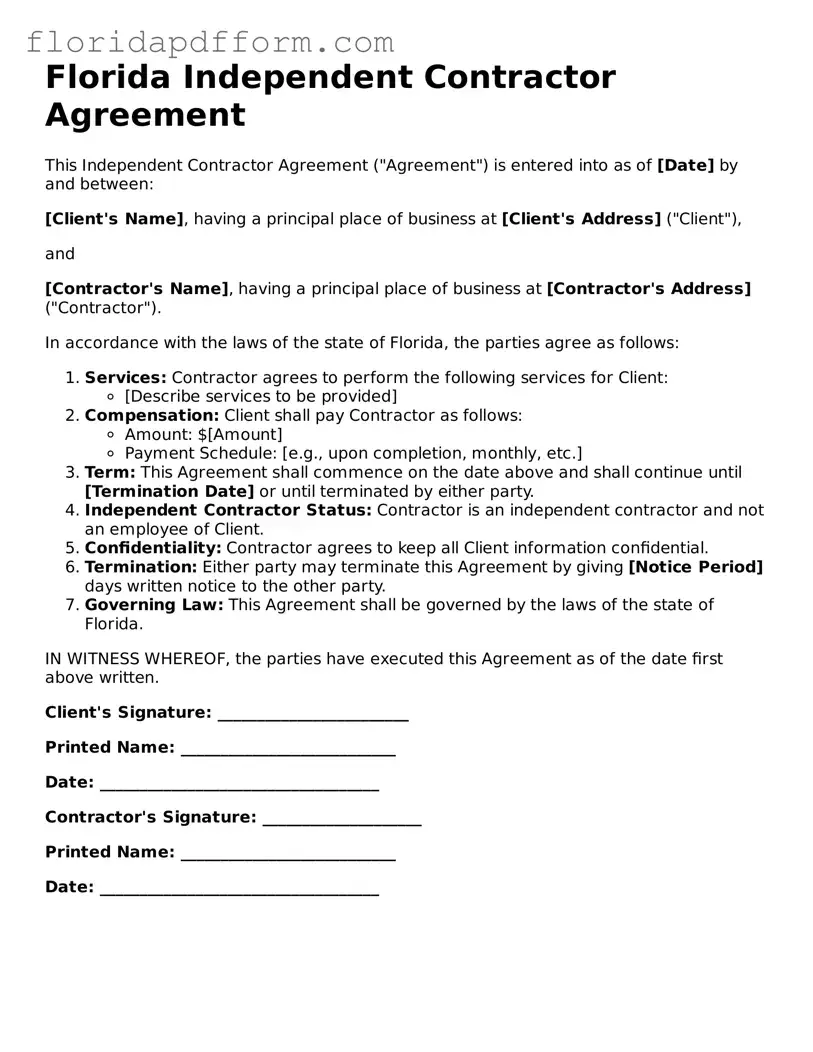Blank Independent Contractor Agreement Template for Florida
Understanding Florida Independent Contractor Agreement
-
What is a Florida Independent Contractor Agreement?
A Florida Independent Contractor Agreement is a legal document that outlines the terms of the working relationship between a business and an independent contractor. This agreement specifies the duties, responsibilities, payment terms, and other essential details to ensure both parties understand their obligations.
-
Why is it important to have an Independent Contractor Agreement?
Having a written agreement is crucial for several reasons:
- It protects both parties by clearly defining expectations and responsibilities.
- It helps prevent misunderstandings and disputes regarding the scope of work.
- It establishes payment terms, including rates and schedules, which can prevent payment issues.
- It provides a legal framework that can be referenced in case of a disagreement.
-
What key elements should be included in the agreement?
A comprehensive Florida Independent Contractor Agreement should include:
- The names and contact information of both parties.
- A detailed description of the services to be provided.
- Payment terms, including rates and due dates.
- Duration of the agreement and termination conditions.
- Confidentiality clauses, if necessary, to protect sensitive information.
- Indemnification and liability clauses to outline responsibility for any issues that may arise.
-
Can an Independent Contractor Agreement be modified?
Yes, an Independent Contractor Agreement can be modified if both parties agree to the changes. It is essential to document any modifications in writing and have both parties sign the updated agreement. This practice helps maintain clarity and ensures that all parties are on the same page regarding any new terms or conditions.
Common mistakes
-
Incorrectly Identifying the Parties: One common mistake is failing to accurately identify the contractor and the hiring party. Ensure that names and addresses are correct.
-
Missing Scope of Work: Not clearly defining the scope of work can lead to confusion. Be specific about the tasks to be performed and any deadlines.
-
Omitting Payment Terms: Failing to include payment terms is a frequent oversight. Specify how much the contractor will be paid and when payments are due.
-
Not Addressing Confidentiality: Some agreements neglect to mention confidentiality. If sensitive information will be shared, include a confidentiality clause.
-
Ignoring Termination Clauses: Not including how either party can terminate the agreement can lead to complications. Clearly outline the process for termination.
-
Forgetting to Include Signatures: A common error is not obtaining signatures from both parties. Ensure that both the contractor and the hiring party sign the agreement.
-
Neglecting to Review Local Laws: Some individuals overlook local regulations that may affect the agreement. Familiarize yourself with any relevant laws in Florida.
How to Use Florida Independent Contractor Agreement
Filling out the Florida Independent Contractor Agreement form is an important step in establishing a clear understanding between the contractor and the client. Completing this form accurately ensures that both parties are on the same page regarding the terms of the engagement. Below are the steps to guide you through the process.
- Start by entering the date at the top of the form. This is the date when the agreement is being executed.
- Provide the name and address of the contractor. Make sure to include any relevant contact information.
- Next, fill in the name and address of the client or company hiring the contractor. Again, include contact details for clarity.
- Clearly define the scope of work. Describe the services the contractor will provide in detail. This section should leave no room for ambiguity.
- Specify the payment terms. Indicate how much the contractor will be paid, the payment schedule, and the method of payment.
- Include the duration of the agreement. State the start date and, if applicable, the end date of the contract.
- Outline any confidentiality or non-disclosure obligations, if necessary. This protects sensitive information shared during the engagement.
- Include any termination clauses. Specify how either party can terminate the agreement and any notice requirements.
- Sign and date the form. Both the contractor and the client must sign the agreement to make it legally binding.
Once the form is filled out and signed, both parties should keep a copy for their records. This agreement serves as a reference point throughout the working relationship, helping to avoid misunderstandings.
Form Specifications
| Fact Name | Description |
|---|---|
| Definition | The Florida Independent Contractor Agreement outlines the relationship between a contractor and a client, specifying the terms of their engagement. |
| Governing Law | This agreement is governed by the laws of the State of Florida, particularly under Florida Statutes Chapter 475. |
| Payment Terms | It clearly defines payment terms, including rates, payment schedule, and any reimbursements for expenses incurred during the project. |
| Termination Clause | The agreement includes a termination clause, allowing either party to end the contract under specified conditions. |
| Liability and Indemnification | It often contains provisions for liability and indemnification, protecting both parties from potential claims arising from the work performed. |
Other Popular Florida Templates
What Documents Do I Need to Become a Florida Resident - An affidavit needed for enrolling in public services or schools.
Roommate Agreement for Friends - Legal document that protects the interests of both the renter and the property owner.
